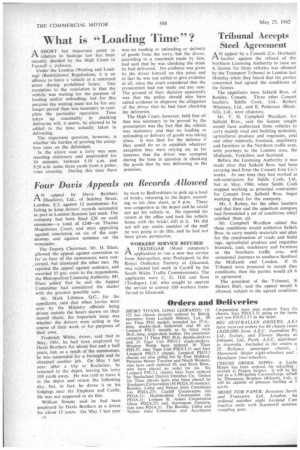What is "Loading Time" ?
Page 36

If you've noticed an error in this article please click here to report it so we can fix it.
ASHORT but important point in relation to haulage law has been recently decided by the High Court in Funnel! v. Johnson.
Under the London (Waiting and Loading) (Restrictions) Regulations, it is an offence to leave a vehicle in a restricted street during prohibited hours. . One exception to the restriction is that the vehicle was waiting for the purpose of loading and/or unloading; but for this purpose the waiting must not be for any longer period than was necessary to complete the particular operation. Time taken up reasonably in checking deliveries will, it seems, be allowed to be added to the time actually taken in delivering.
The important question, however, is whether the burden of proving the exception rests on the defendant.
In the above case a lorry was seen standing stationary and unattended for 10 minutes, between 9.10 a.m. and 9.20 a.m. some three yards from a pedestrian crossing. During this time there was no loading or unloading or delivery of goods from the lorry, but the driver, according to a statement made by him, had said that he was checking the stock he had delivered. No evidence was given by the driver himself on this point and in fact he was not called to give evidence at all, since the court considered that the prosecution had not made out any case. The ground of their decision apparently was that the police should also have called evidence to disprove the allegation of the driver that he had been checking the deliveries.
The High Court, however, held that all that was necessary to be proved by the prosecution was the fact that the vehicle was stationary and that no loading or unloading or delivery of goods was taking place. It was then for the defence if they could do so to establish whatever exception they were relying on, as for instance that the driver was occupied during the time in question in checking the goods that he was delivering to the premises.












































































































